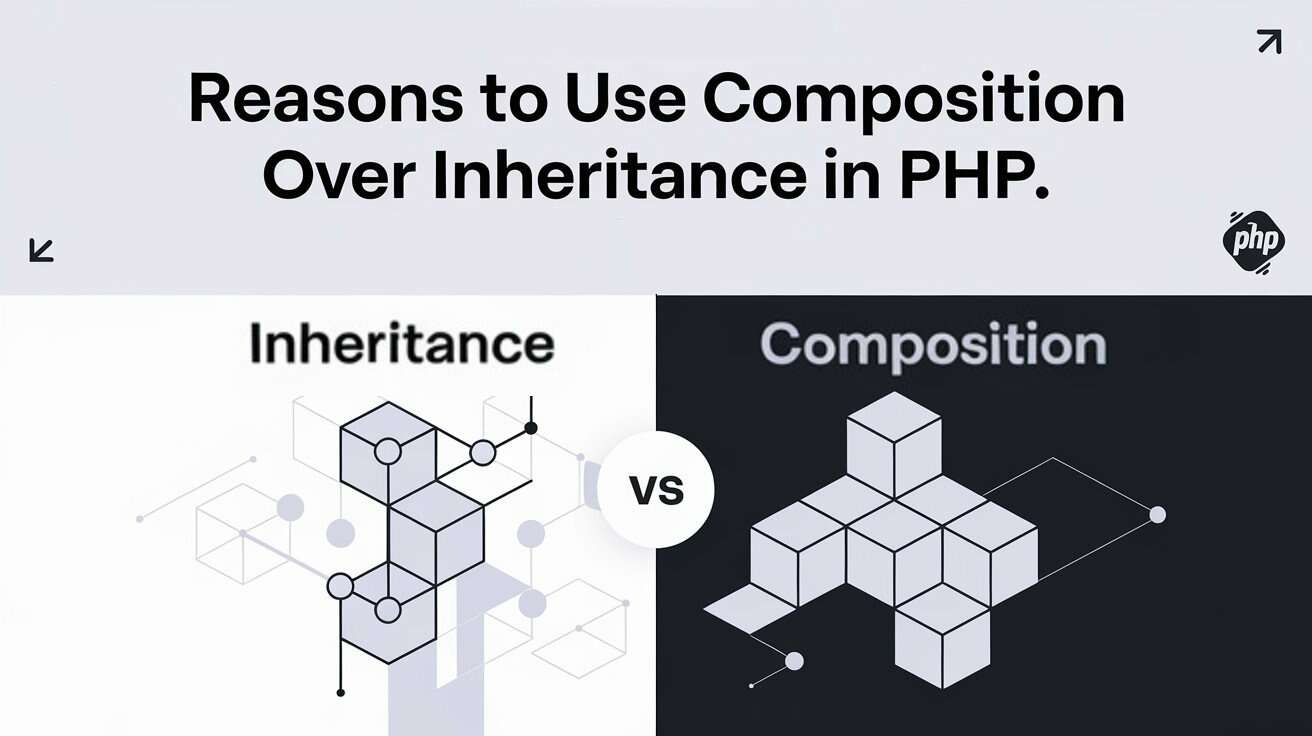Composition vs. Inheritance in PHP: Why Composition is Better for Your Code

In object-oriented programming, polymorphism can be achieved through two primary approaches: Inheritance and Composition. Let’s dive into their definitions and explore why composition is often the better choice.
Inheritance: The "Is-a" Relationship
Inheritance allows a class to derive behavior and properties from another class, creating an "is-a" relationship. For instance, "A dog is an animal" implies that the Dog class inherits from the Animal class. Here’s an example:
class Animal {
public function makeSound() {
echo "This animal makes a sound.";
}
}
class Dog extends Animal {
public function bark() {
echo "This dog is barking.";
}
}
$dog = new Dog();
$dog->makeSound(); // Output: This animal makes a sound.
$dog->bark(); // Output: This dog is barking.While inheritance simplifies code reuse, it introduces tight coupling between the parent and child classes, making future modifications riskier.
Composition: The "Has-a" Relationship
Composition, on the other hand, enables a class to contain instances of other classes, forming a "has-a" relationship. For example, "A car has an engine." Here’s how this works:
class Engine {
public function start() {
echo "Engine is starting.";
}
}
class Car {
private $engine;
public function __construct(Engine $engine) {
$this->engine = $engine;
}
public function drive() {
$this->engine->start();
echo " Car is driving.";
}
}
$engine = new Engine();
$car = new Car($engine);
$car->drive(); // Output: Engine is starting. Car is driving.Composition vs. Inheritance
Feature | Composition | Inheritance |
Relationship | "Has-a" | "Is-a" |
Coupling | Loosely coupled | Tightly coupled |
Flexibility | High; you can swap or replace components | Low; changes in the parent affect child |
Reuse | Reuses behavior via delegation | Reuses behavior via extension |
By using composition, classes remain modular and adaptable to change. Let’s explore the advantages of composition in greater detail.
1. Maintainability and Loose Coupling
Consider this inheritance-based example:
class Logger {
public function log($message) {
echo "Log: $message";
}
}
class FileLogger extends Logger {
public function writeToFile($message) {
$this->log($message);
echo " Writing log to file.";
}
}
$fileLogger = new FileLogger();
$fileLogger->writeToFile("System started");
// Output: Log: System started Writing log to file.In this case, changes to the Logger class may break the FileLogger class, creating tight coupling. Now, let’s rewrite it using composition:
class Logger {
public function log($message) {
echo "Log: $message";
}
}
class FileLogger {
private $logger;
public function __construct(Logger $logger) {
$this->logger = $logger;
}
public function writeToFile($message) {
$this->logger->log($message);
echo " Writing log to file.";
}
}
$logger = new Logger();
$fileLogger = new FileLogger($logger);
$fileLogger->writeToFile("System started");
// Output: Log: System started Writing log to file.With composition, Logger and FileLogger are decoupled, reducing the risk of unintended side effects.
2. Better Testability
Composition makes it easier to mock dependencies for testing. Let’s look at an example:
class Mailer {
public function send($message) {
echo "Email sent: $message";
}
}
class Notification {
private $mailer;
public function __construct(Mailer $mailer) {
$this->mailer = $mailer;
}
public function notify($message) {
$this->mailer->send($message);
}
}
// Mocking Mailer for testing
class MockMailer {
public function send($message) {
echo "Mock email sent: $message";
}
}
$mockMailer = new MockMailer();
$notification = new Notification($mockMailer);
$notification->notify("Test notification");
// Output: Mock email sent: Test notificationHere, we replace the real Mailer class with a MockMailer class for testing purposes, ensuring the Notification class behaves as expected.
3. Overcoming the Lack of Multiple Inheritance
PHP doesn’t support multiple inheritance, but composition provides a workaround. Consider this example:
class SoundSystem {
public function playMusic() {
echo "Playing music.";
}
}
class AirConditioner {
public function setTemperature($temp) {
echo "Setting temperature to $temp°C.";
}
}
class Car {
private $soundSystem;
private $airConditioner;
public function __construct(SoundSystem $soundSystem, AirConditioner $airConditioner) {
$this->soundSystem = $soundSystem;
$this->airConditioner = $airConditioner;
}
public function enjoyRide() {
$this->soundSystem->playMusic();
echo " ";
$this->airConditioner->setTemperature(22);
}
}
$soundSystem = new SoundSystem();
$airConditioner = new AirConditioner();
$car = new Car($soundSystem, $airConditioner);
$car->enjoyRide();
// Output: Playing music. Setting temperature to 22°C.Here, the Car class combines functionality from both SoundSystem and AirConditioner without relying on inheritance.
Conclusion
While inheritance can simplify initial development, it often leads to tightly coupled and less flexible code. Composition, by contrast, promotes modularity, maintainability, and testability. By choosing composition over inheritance, you can build PHP applications that are robust, scalable, and easier to maintain.
.
🔥 Boost Your Productivity with Ctrl+Alt+Cheat!
Take your coding efficiency to the next level with Ctrl+Alt+Cheat, the ultimate VSCode extension for developers. Whether you're working with PHP, JavaScript, Laravel, or any other technology, this extension provides over 60 curated cheat sheets to speed up your workflow.
Special Offer: Use the discount code "YT-FAMILY" at checkout and get an exclusive 50% discount. Don't miss this chance to supercharge your development experience—grab Ctrl+Alt+Cheat today!
👉 Download Ctrl+Alt+Cheat today and start coding like a pro!











Please login or create new account to add your comment.